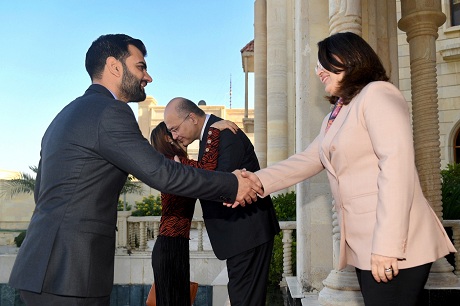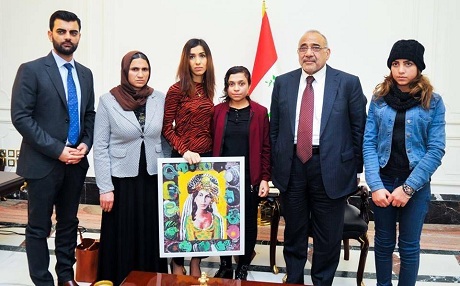ERBIL, Kurdistan Region – Nadia Murad, the Yezidi campaigner and survivor of the ISIS genocide who was awarded the 2018 Nobel Peace Prize, arrived in Baghdad on Wednesday, where she and her fiancée Abid Shamdeen were received by Iraqi President Barham Salih and the First Lady Sarbagh Salih.
They later met with Prime Minister Adil Abdul-Mahdi who hosted a reception in Murad’s honour.
Murad, 25, was born in the southern village of Kocho in the Shingal region. In 2014, she was kidnapped by ISIS and held captive prior to escaping through the Kurdistan Region of Iraq. After escaping and finding refuge in Germany, she went on to become a world recognized campaigner for women's rights.

In her Nobel Peace Prize acceptance speech in Oslo on Monday, Murad called for justice for Yezidi women and girls.
“Daesh tried to annihilate an entire community in Iraq by enslaving their women and killing their men,” she said.
“But in the massacre that happened I lost my mother and six of my friends. Our lives changed overnight in a way that we will never forget. The fabric of the Yezidi community was destroyed,” she added.
.jpeg) Murad and Salih meet in Baghdad. December 12, 2018. Photo: Karim Kadim / AP
Murad and Salih meet in Baghdad. December 12, 2018. Photo: Karim Kadim / AP
Murad is especially critical of the previous Iraqi government’s neglect of the Yezidis.
“It didn’t give anyone their rights before or after ISIS. Looking at the previous government, we haven’t seen any help in the past four years. We hope the new government will help everyone in the country unlike previous governments. My hope is they will give more women’s rights,” Murad said on the eve of the Nobel ceremony.
President Salih said Murad “embodies the suffering and tragedies Iraqis have gone through in the past and represents the courage and determination to defend rights in the face of the oppressor,” AP reports.
The Yezidis have endured a “heinous and a rare crime in history,” said Salih, calling on parliament to pass a law recognizing it as a genocide.
Prime Minister Adil Abdul-Mahdi hailed the role of all Iraqis in standing against the brutality of ISIS.
Victory over ISIS “wasn’t accomplished with bullets and fighters alone, despite their importance,” Abdul-Mahdi said at a reception for Murad. “But rather through the steadfastness of Iraqi men and women, defense against injustice and terrorism and the conditions of hostages and horrible violations committed by the Daesh [ISIS] gang.”
The reception was attended by a number of politicians and Yezidi women.
“The whole Iraqi people is proud of its daughter Nadia Murad, who, through her stances, expressed the plight and dedication of all Iraqi men and women from the different sects, components and the oppressed, especially in the fight against ISIS, and exposed the crimes of that criminal gang in front of the whole world and helped the just cause of her people to victory,” read a statement from the Council of Ministers.
The governing body described the Yezidi minority as “one of the gems and colours in Iraq’s glimmering spectrum.”
It invited Murad, who fled to Germany after escaping ISIS, to return to Iraq “and assist her Iraqi sisters in defending their freedom and rights, and bolstering their role in society.”

PM Adil Abdul-Mahdi (2nd R) presented Nadia Murad (3rd L) with a painting to commemorate her receiving the Nobel Peace Prize. Photo: PM Office/handout
Murad noted that ISIS “committed crimes against all Iraqis, not only Yezidis,” according to a statement from Abdul-Mahdi’s office.
She said that the militants’ goal was to “destroy our society, sow seeds of division between Iraqis, and profane the dignity of Iraqi woman.”
This is a developing story… Last updated 6.30 pm




Comments
Rudaw moderates all comments submitted on our website. We welcome comments which are relevant to the article and encourage further discussion about the issues that matter to you. We also welcome constructive criticism about Rudaw.
To be approved for publication, however, your comments must meet our community guidelines.
We will not tolerate the following: profanity, threats, personal attacks, vulgarity, abuse (such as sexism, racism, homophobia or xenophobia), or commercial or personal promotion.
Comments that do not meet our guidelines will be rejected. Comments are not edited – they are either approved or rejected.
Post a comment